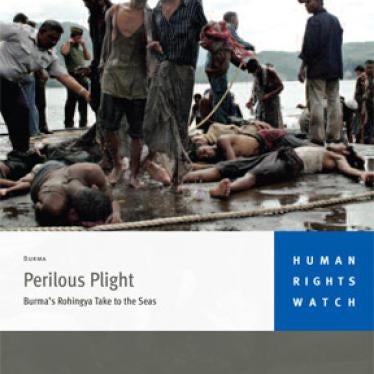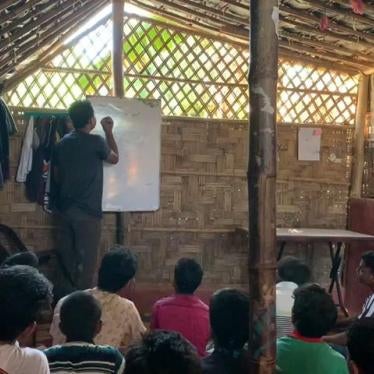(New York) - Burma's neighbors should press the Burmese military government to end systematic abuses of Rohingya Muslims and protect those who flee to their shores, Human Rights Watch said in a report released today. Human Rights Watch said that the Association of Southeast Asian Nations (ASEAN) has failed to address the Rohingya's plight adequately.
The 12-page report, "Perilous Plight: Burma's Rohingya Take to the Seas," examines the causes of the exodus of Rohingya people from Burma and Bangladesh, and their treatment once in flight to Southeast Asian countries. Persecution and human rights violations against the Rohingya inside Burma, especially in Arakan state, have persisted for over 20 years, with insufficient international attention. Such abuses include extrajudicial killings, forced labor, religious persecution, and restrictions on movement, all exacerbated by a draconian citizenship law that leaves the Rohingya stateless.
"The treatment of the Rohingya in Burma is deplorable - the Burmese government doesn't just deny Rohingya their basic rights, it denies they are even Burmese citizens," said Elaine Pearson, deputy Asia director at Human Rights Watch. "Instead of sidestepping the issue, ASEAN should be pressing Burma's military rulers to end their brutal practices."
The Burmese military government's violent and discriminatory treatment, exacerbated by chronic poverty, has pushed many Rohingya to flee to neighboring Bangladesh, where living standards in refugee camps remain primitive and options for resettlement slim. From Bangladesh, every year thousands of Rohingya men and boys pay to be smuggled to Malaysia via other Southeast Asian countries. Some are fleeing for their lives; others are economic migrants seeking to feed their families. Because they lack official papers, almost everywhere they go, they live in fear of arrest and possible repatriation to Burma.
In January 2009, cameras captured boatloads of starving Rohingya arriving in Southern Thailand and Indonesia. The photos, which show Thai navy ships towing boats of Rohingya back into the open seas to deter further arrivals, gave brief international prominence to the issue. Thousands of other journeys each year go unnoticed. In late 2008 and early 2009, the number of Rohingya departing from Bangladesh and Burma was estimated at 6,000, double the number from the previous year.
Scores are feared to have died as a result of Thailand's "push-back" policy. Some of the survivors who reached Indonesia or the Indian Andaman Islands described how Burmese naval personnel who had intercepted their boat on the open seas tortured and beat them.
ASEAN leaders have admitted that a regional solution is necessary to address the annual exodus of Rohingya. Yet ASEAN did not place the Rohingya on the formal agenda of its February summit meeting, and Burmese officials simply denied the Rohingya were from Burma, but said they would accept any "Bengali" who could prove Burmese citizenship.
A meeting in April of the Australia and Indonesia-led multilateral grouping, the Bali Process for People Smuggling, Trafficking in Persons, and Related Transnational Crime, also could not reach a consensus on a regional mechanism for dealing with the Rohingya.
"ASEAN's collective inertia on the Rohingya's plight is a stain on its reputation," said Pearson. "ASEAN's inaction also sends a clear message to Burma's generals that their horrendous persecution can continue."
In "Perilous Plight," Human Rights Watch calls on Burma's military government to recognize Rohingya as citizens, ensure their freedom of movement, and give human rights and humanitarian organizations access to Arakan state.
Bangladesh, India, Thailand, Malaysia, and Indonesia should press Burma's military government to end abuses, the report says. They should also stop forcibly returning Rohingya to Burma where they face persecution, and they should alter their laws and procedures to ensure that an appropriate determination of the refugee status can take place for non-citizens who reach their shores.
"Persecution of the Rohingya is nothing new, so it's time for Burma's neighbors to act to stop them from being further abused," said Pearson. "Rather than sending them back to Burma or into the open sea, countries receiving Rohingya should determine if they are refugees or asylum seekers and give them protection."






